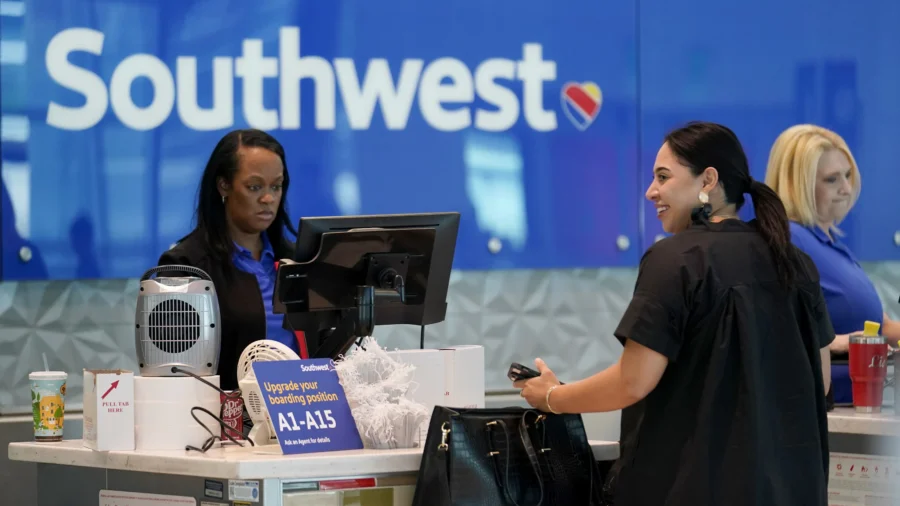Southwest Airlines has announced a major shift in its operational model, including the end of its hallmark open-seating system, in an effort to align with shifting consumer preferences and boost profitability.
The changes are part of a broader three-year transformation plan unveiled by Southwest Airlines CEO Bob Jordan during an Investor Day event in Dallas on Sept. 26. The plan, branded “Southwest. Even Better,” promises to overhaul several aspects of the airline’s business, including assigned seating, premium offerings, and international partnerships.
“We’re now ushering in a new era at Southwest, moving swiftly and deliberately to transform the company by elevating the customer experience, improving financial performance, and driving sustainable shareholder value,” Jordan said in a statement.
Perhaps the most notable change for Southwest is the introduction of assigned seating, a departure from the airline’s open-seating model, which has been a hallmark of its business for more than five decades. Under the new system, passengers will be able to book assigned seats starting in late 2025, with the first flights operating under the new seating arrangement in early 2026.
The airline cited internal surveys that revealed that 80 percent of the carrier’s customers, and 86 percent of passengers from competing airlines, prefer assigned seating.
In addition to assigned seating, Southwest is introducing premium seating options, with a third of its seats offering up to five inches of additional legroom for a premium fare. These changes are designed to tap into the lucrative business travel market, offering leisure travelers more choices while boosting the airline’s per-passenger revenue.
Under the plan, Southwest’s “bags fly free” policy remains intact, with the carrier saying that extensive research shows that this policy remains the most important feature setting Southwest apart from its competitors.
Airline carriers in the United States collected more than $7 billion in bag fees last year, with major carriers such as American and United earning more than $1 billion each. Southwest, however, has resisted imposing such fees, seeing it as a key factor in maintaining its loyal customer base.
“The company believes that any change in the current policy that provides every customer two free checked bags would drive down demand and far outweigh any revenue gains created by imposing and collecting bag fees,” Southwest said in a statement.
As part of the overhaul, Southwest also plans to expand its global footprint through partnerships with international carriers. Icelandair will be the first such partner, with Southwest flights connecting through Baltimore–Washington International Airport starting in 2025. The airline is expected to announce at least one more international partner next year.
On the operational side, Southwest said it’s focusing on efficiency improvements. The airline plans to introduce redeye flights in key markets by February 2025 to maximize aircraft utilization and reduce turnaround times between flights. These measures are part of a broader push to increase aircraft productivity without adding new planes to the fleet.
“The strategic vision announced today is designed to return us to financial prosperity and drive value creation,” Tammy Romo, executive vice president and chief financial officer at Southwest, said in a statement. “We have a clear and measurable path that we expect will enable us to cover our WACC in 2026 and achieve after-tax ROIC of at least 15 percent in 2027.”
WACC, or weighted average cost of capital, is the average rate that a company is expected to pay investors for using their capital, and Romo’s statement indicated that Southwest expects to earn enough profit from its operations to cover the cost of the capital it has raised. ROIC, or return on invested capital, measures the efficiency with which a company generates profit from its investments, with expectations for a 15 percent after-tax ROIC suggesting strong profitability prospects.
Southwest’s transformation comes at a critical time for the airline, which has faced mounting pressure from Elliott Investment Management, an activist hedge fund that owns more than 10 percent of the airline’s shares. The fund has been pushing for leadership changes and a comprehensive review of Southwest’s business model, accusing management of being too slow to adapt to the evolving market and consumer landscape.
Elliott Investment recently announced plans to call a special shareholder meeting in the coming weeks, at which the hedge fund is expected to propose replacing Jordan and much of Southwest’s board with a slate of new directors who would reevaluate the airline’s strategy.
In response to Elliott Investment, Southwest reiterated its willingness to work constructively with the hedge fund, while highlighting the company’s ongoing transformation plan and defending Jordan, insisting that a leadership change during this critical period would be detrimental to shareholders.
Southwest also announced on Sept. 26 that its board approved a $2.5 billion share-repurchase program, signaling confidence in the company’s strategic direction.
From The Epoch Times

